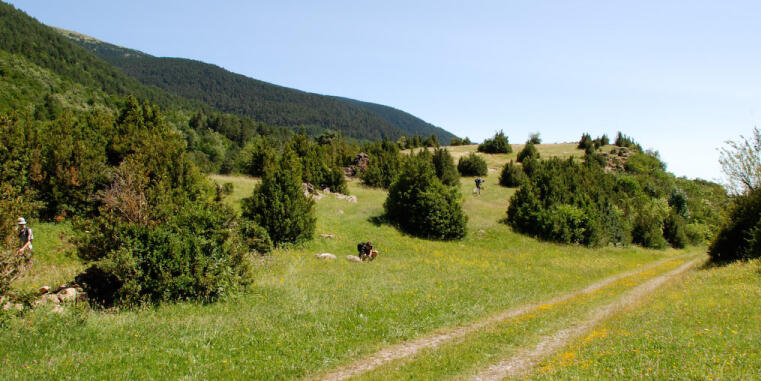
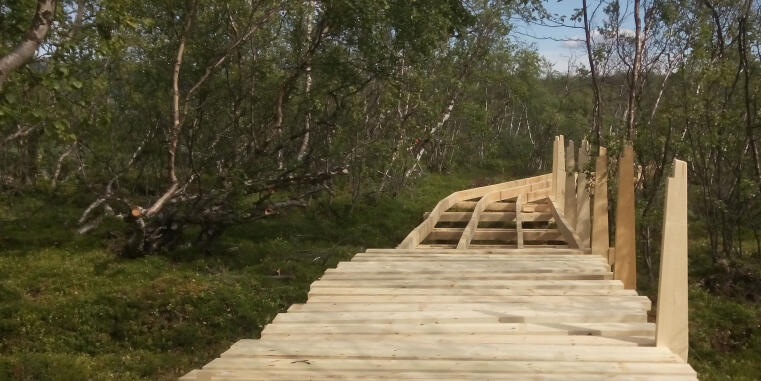
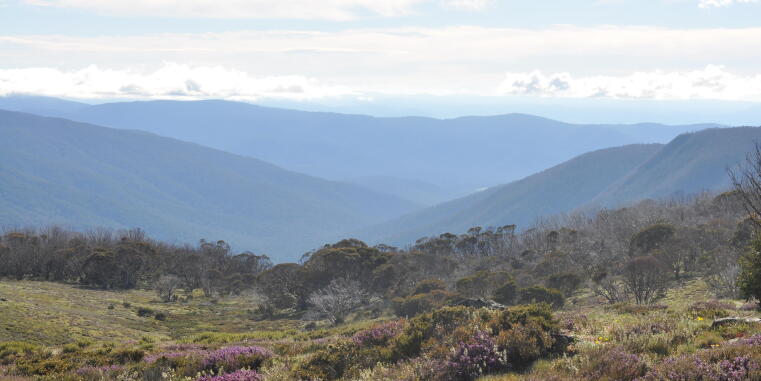
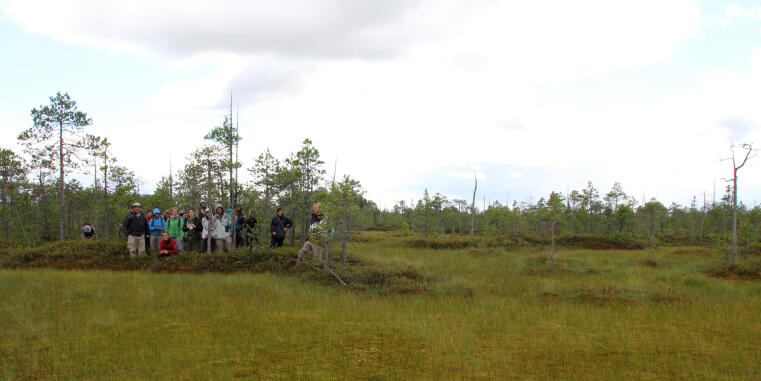
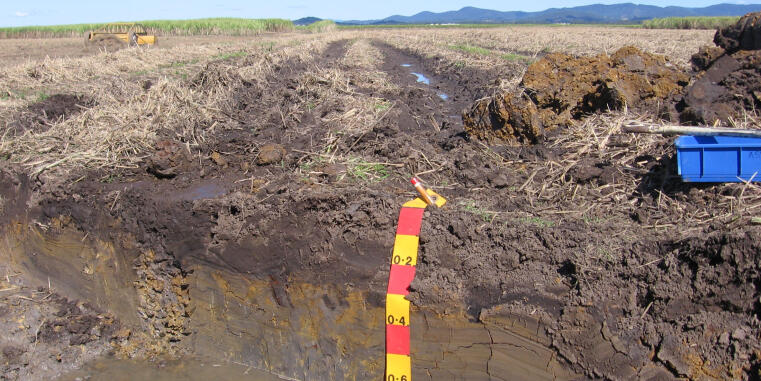
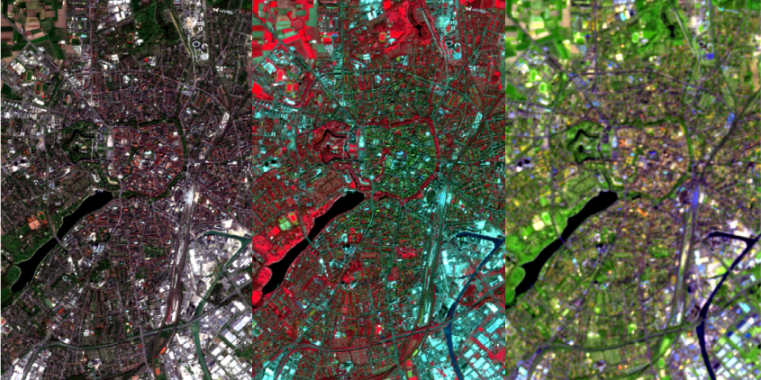
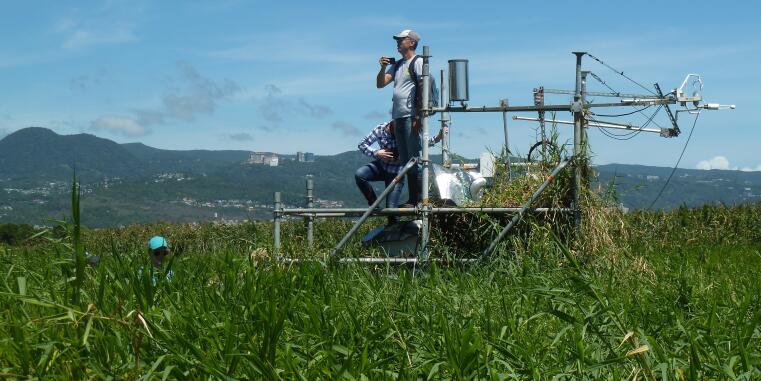
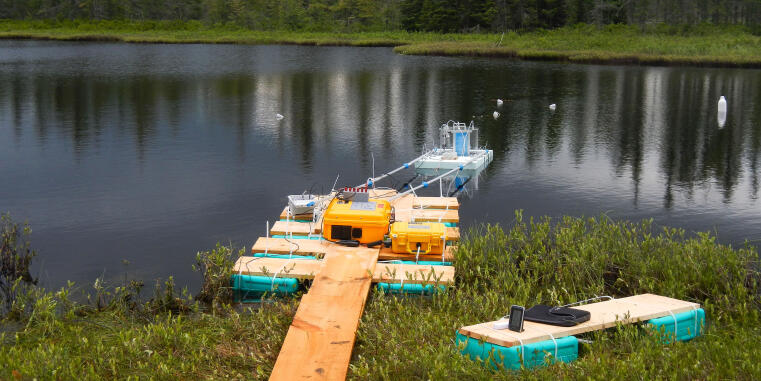
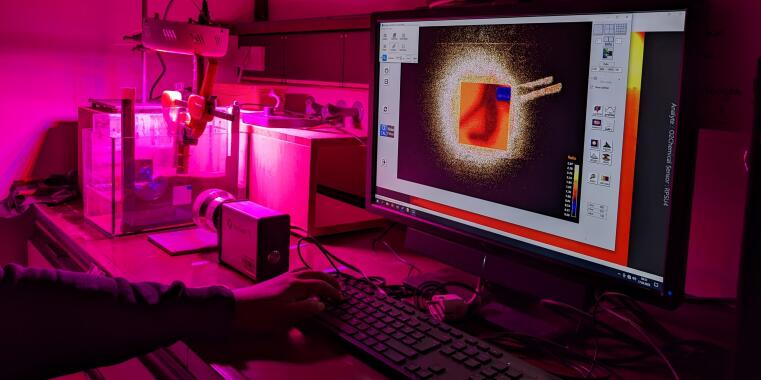
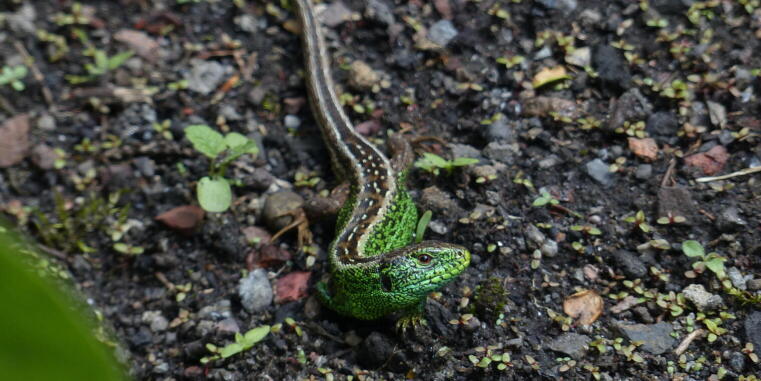











A team of three working groups at our institute recently conducted a study examining trends in moisture conditions across European peatlands based on satellite time-series data spanning the last four decades. The results reveal a significant increase in moisture in the boreal and oceanic regions of Europe, while peatlands in the temperate and continental regions show intensified drying trends. Particularly noteworthy is the high spatial heterogeneity of moisture trends on a local scale, which highlights not only the impacts of climate change but also the effects of management practices.
The study can be found here.
Prof. Dr. Otto Klemm retired from the ILÖK on 1 October 2024. The geoecologist came to Münster from the Bayreuth Institute for Terrestrial Ecosystem Research (BITÖK) in 2002. He established the field of climatology in Münster and thus set important accents for a fundamental and evidence-based contemporary landscape ecology. As the long-standing managing director of the ILÖK, he contributed significantly to the institute and the landscape ecology course becoming so broadly based and so successful overall. The research fields he established in fog and aerosol research and in the exchange of substances between the atmosphere and the surface were based on Otto Klemm's clear analytical approach, meticulousness in terms of (measurement) technology, and strict scientific rigour. He was held in high regard by his students and colleagues at the institute for many reasons. Even before his retirement, he had provided the impetus to expand the field of climatology research by setting up a new working group at ILÖK. As a result, the climatology research at ILÖK will be continued in the future as the ‘Biosphere-Atmosphere Interaction’ working group.
He also built up an international network, particularly with research institutions in Taiwan, which he repeatedly visited and where he conducted intensive research. Otto Klemm is by no means retiring. On the contrary: he has taken up the position of Chair Professor at the National Central University, Department of Atmospheric Sciences, in Taiwan, and will continue his scientific work there.
The ILÖK wishes him all the best in his future endeavours.
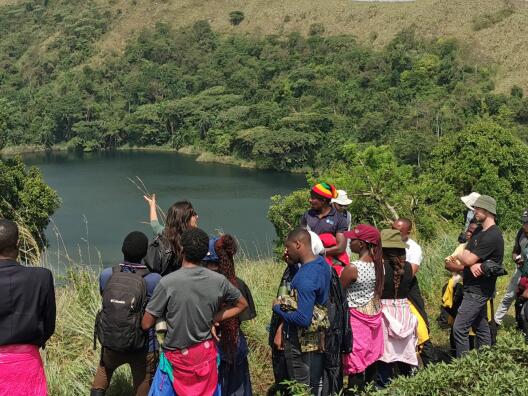
Professor Mana Gharun, from the Biosphere-Atmosphere Interaction Research Group, took part in the first Summer School on “Assessment of Tropical Forest and Soil Resources” in Fort Portal, Uganda. She taught participants about soil greenhouse gas fluxes and how to measure them with low-cost sensors. The event was a joint effort, organized with colleagues from ETH Zürich (Switzerland), Ghent University (Belgium), the University of Augsburg (Germany), the Kyaninga Forest Foundation (Uganda), and Mountains of the Moon University (Uganda).

A new paper from the BIODESERT consortium has made it onto the cover of the current issue of NATURE. Norbert Hölzel and Frederike Velbert have contributed extensive data and vegetation ecology expertise from nine study sites in the steppes and semi-deserts of central Kazakhstan to this study. Using a global data set, the article shows for the first time that plants in arid regions are characterized by an unexpectedly large diversity of functional traits beyond a critical threshold of aridity.
Link to the article: Gross, N., Maestre, F.T., Liancourt, P. et al. Unforeseen plant phenotypic diversity in a dry and grazed world. Nature 632, 808–814 (2024). https://doi.org/10.1038/s41586-024-07731-3
Link to the podcast: https://www.nature.com/articles/d41586-024-02578-0
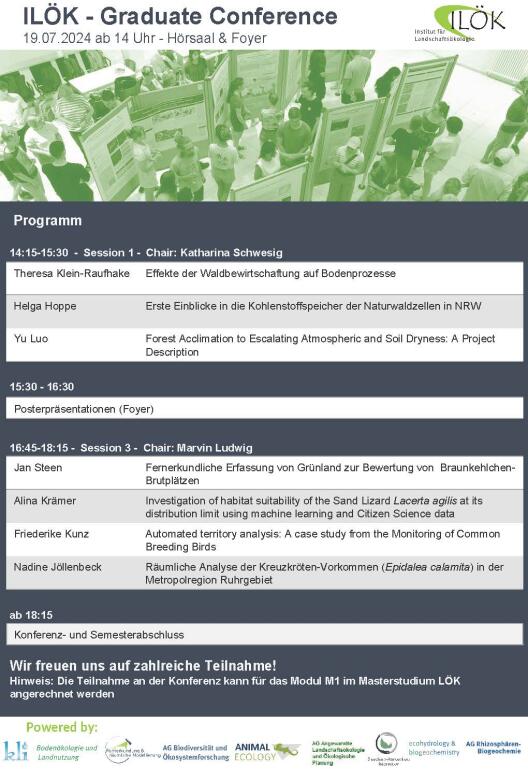
This year's Ilök Graduate Conference will once again take place in the summer semester, where graduates will present their theses. The program has now been finalized and can be found here. We can expect an exciting program of lectures and scientific posters with stimulating discussions.
We are looking forward to all the contributions and an informative and relaxed end of the semester!
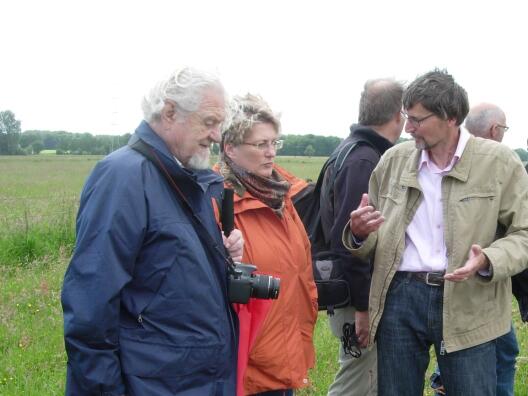
The Institute of Landscape Ecology mourns the loss of one of its pioneers, Prof. em. Dr. Karl-Friedrich Schreiber, who passed away on May 27th, 2024 at the age of 97. Our thanks and sympathy also go to his family, with whom we feel connected in mourning.
Karl-Friedrich Schreiber was born on January 9th, 1926 in Deutsch-Krone/Pomerania which is in Poland today. He studied Agricultural Sciences at the University of Hohenheim from 1949. Already in his first semester, he was gripped by the enthusiasm with which the vegetation ecologist Heinz Ellenberg, who was teaching at Hohenheim at the time, described the development of the cultural landscape, which prompted him to focus his studies on plant cultivation with the subjects of botany and soil science. Also in Hohenheim, he completed his doctorate in 1961 on the subject of "Site-related variation of Arrhenatherum elatius meadows in south-west Germany" and then his habilitation in 1968, when a venia legendi for fruit growing and landscape ecology was awarded for the first time in Germany. In 1973, Karl-Friedrich Schreiber was appointed to the then newly established Chair of Landscape Ecology at the University of Münster, which he held until his retirement in 1991.
Karl-Friedrich Schreiber was always an enthusiastic university lecturer. With an emphasis on practical aspects, he was particularly committed to the increased integration of biological-ecological disciplines such as vegetation science, animal ecology and soil science into the study of landscape ecology, which at the time was still a sub-discipline of geography. Together with his colleague Prof. Friedrich-Karl Holtmeier, he paved the way for the Institute of Landscape Ecology, which was founded in 1994 and whose degree courses are still in high demand today. The success of this reorientation can be measured by the fact that many of his students are now or were employed in responsible positions in environmental authorities, planning offices and biostations as well as in universities and universities of applied sciences throughout Germany.
A highlight of his scientific work is undoubtedly the fallow experiments in Baden-Württemberg, which he initiated in 1975 and actively supported until a few years ago. A similar large-scale management experiment was established by him in the 1980s in wet meadows in Münsterland and continued until a few years ago by his student Dr. Peter Schwartze. The fact that these elaborate field experiments could be maintained and scientifically monitored over decades is primarily due to the tenacious persistence and persuasiveness of the initiator.
Karl-Friedrich Schreiber was a founding member of the Society for Ecology, which he served as President and Vice President for several years, as well as co-editor of various journals in German-speaking countries. He has also contributed significantly to the international reputation of landscape ecology in Münster, whether through close and long-standing cooperation with the Arid Ecosystems Research Center at the Hebrew University in Jerusalem, as Vice President of the International Association for Landscape Ecology or as a member of the editorial board of the Journal Landscape Ecology.
In Karl-Friedrich Schreiber, the Institute of Landscape Ecology has lost a colleague who remained committed, thoughtful and people-oriented into old age and whose wise decisions continue to have an impact today.
Norbert Hölzel
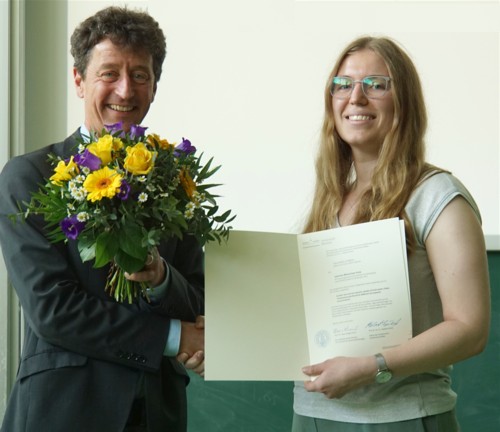
The Jeannine Böhmichen Prize was awarded during the Geo.Science.Day on 14 May 2024. The prize is awarded to a Bachelor's thesis that, among other things, presents complex issues from landscape ecology in a clear and concise manner, independently raises questions of high originality or topicality, presents multi-layered information in a clear and concise manner or demonstrates the creative scope of students. As a rule, only one prize is awarded per academic year.
Prof. Dr. Tillmann Buttschardt gave the laudatory speech and presented the award certificate to Hedda Lil Müller. She received the award for her Bachelor's thesis on the topic: "Growth rate and microplastic uptake of fresh water ciliate Tetrahymena pyriformis at different microplastic concentrations".
We warmly congratulate the award winner!
Read more
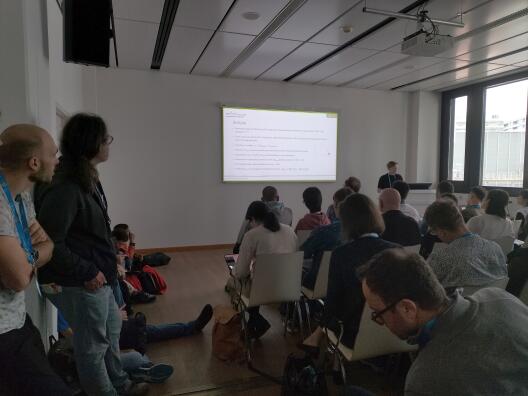
Last week, numerous colleagues from the Institute of Landscape Ecology took part in the EGU 2024, the General Assembly of the European Geosciences Union, in Vienna. Among them were members of the working groups Biosphere-Atmosphere Interaction, Remote Sensing and Spatial Modelling, Rhizosphere Biogeochemistry as well as Ecohydrology and Biogeochemistry.
Our BSc Landscape Ecology student Elisa Jordan presented the results of her BSc thesis project that she completed with the Biosphere-Atmosphere Interaction research group. The title of Elisa´s project and talk was "Assessing extreme temperature volatilities across Germany between 1990 and 2022" and her presentation was marked as the highlight of a session on Land-Atmosphere Interactions and Climate Extremes.
The two dates of the Ilök colloquium that were canceled in the winter semester will be rescheduled. You can find the new dates here. As always, the lectures will take place at 6 p.m. c.t. in the Geo1 lecture hall. They will be held in English with English slides.
On Tuesday, 07.05.24 Dr. Jörg Bendix from the University of Marburg will give a lecture on the topic "Machine learning in fog climatology, ecology and nowcasting –the ultimate approach?".
The second talk will take place on Monday, 13.05.24 Dr. Daniel Graeber from UFZ Magdeburg will speak about "Through The Stoichiometric Lens: Decoding Freshwater Ecosystem Responses to Anthropogenic Macronutrient Shifts".
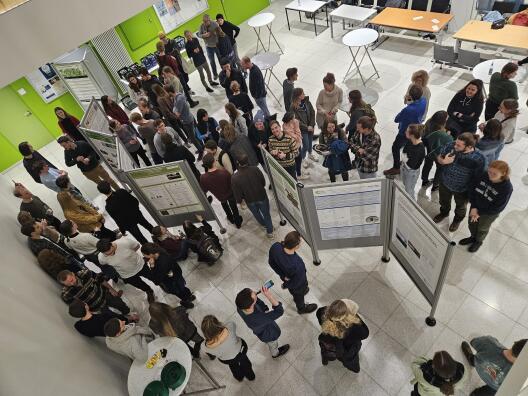
Our first ILÖK graduate conference was held on the 2nd of February. The conference featured a diverse range of topics, with 13 posters and 9 presentations by our master's students presenting their projects and theses. We would like to thank all participants, session chairs, and presenters for their contributions to the success of this conference. It was a lively event, fostering valuable presentations and discussions throughout. Congratulations at this point to the winners of the presentation and poster awards: Robin Maares and Fabian Karwinkel!
Save the date: our next ILÖK graduate conference will be on the 19th of July 2024.
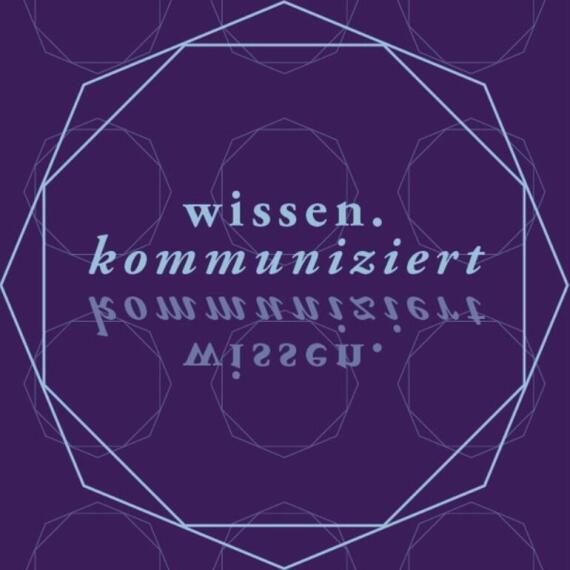
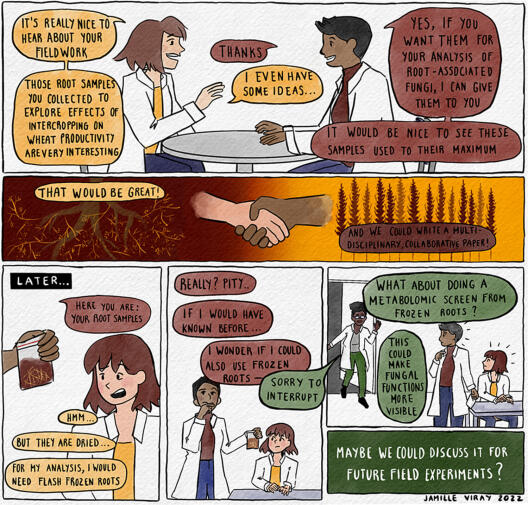
Interdisciplinary scientific collaboration is important for successful research and the establishment of young scientists. But sometimes it gets stuck - what is the reason?
Erica Mc Gale (Uni Lausanne) and Lena Neuenkamp from the Biodiversity and Ecosystem Research Group deal with this topic in this article. They find that there is a need for more information on the barriers to collaboration. To investigate this, they have created a short questionnaire and sincerely ask for your participation.
This will allow them to get to the bottom of collaboration hurdles in more detail in a follow-up study. It will take no more than 10 minutes and is done anonymously.
Here is the link to the questionnaire.
Thank you for your help!
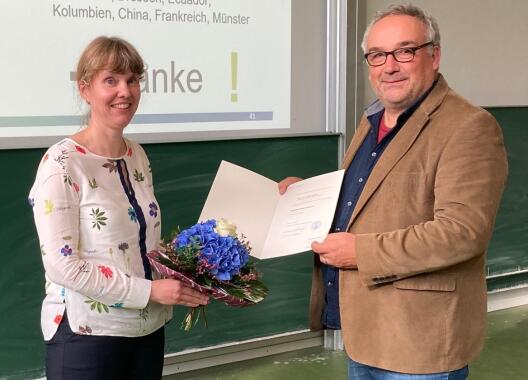
PD Dr. Ute Hamer wurde zur Außerplamäßgen Professorin ernannt.
Am 13. Okotber erhielt sie nach ihrer Antrittsvorlesung zum Thema Bodenökologie und die Bewertung von Bodenqualität von Dekan Prof. Dr. Dr. Hölzel die Ernennungsurkunde.
Das ILÖK gratuliert sehr herzlich und wünscht ihr alles Gute. Seit diesem Wintersemester können die Studierenden im M.Sc. Landschaftsökologie nun auch ein neues Wahlmodul zum Thema Bodenökologie belegen.
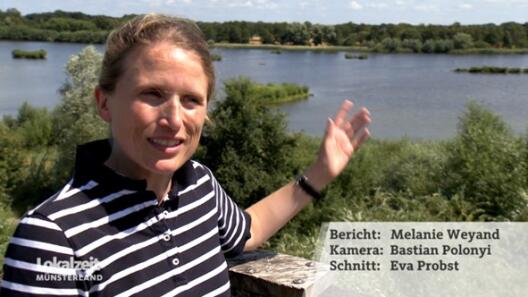
The Lokalzeit Münsterland of the WDR reported on 17.7.23 about the microplastic investigations in the sewage fields of Münster ("Rieselfelder"). The team around Dr. Friederike Gabel (ILÖK) and Prof. Dr. Bodo Philipp (Institute for Molecular Microbiology and Biotechnology) investigated the occurrence and distribution of microplastics in the bird paradise of the Rieselfelder. This revealed a very clear but heterogeneous contamination by microplastics. What effects this has on the animals living there still requires further research.
The report can be found here (German only).
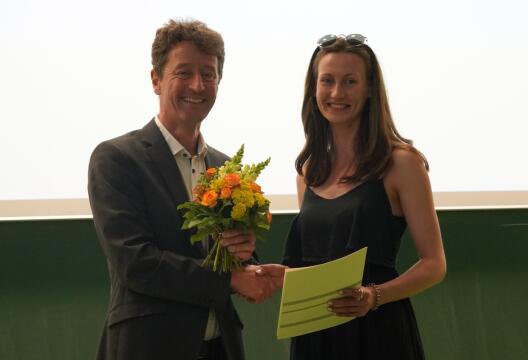
The Jeannine Böhmichen Prize for 2022 was awarded during the Geo.Science.Day on 15.06.2023. The prize is awarded to a Bachelor's thesis that, among other things, presents complex issues from landscape ecology in a clear and concise manner, independently raises questions of high originality or topicality, presents multi-layered information in a clear and concise manner or demonstrates the creative scope of students.
Prof. Dr. Tillmann Buttschardt gave the laudation and presented the award certificate to Isabelle Walgath. She received the award for her Bachelor's thesis with the topic: The effect size of watercourse margins of different widths on the ecological condition of an agriculturally influenced watercourse.
We warmly congratulate the award winner!
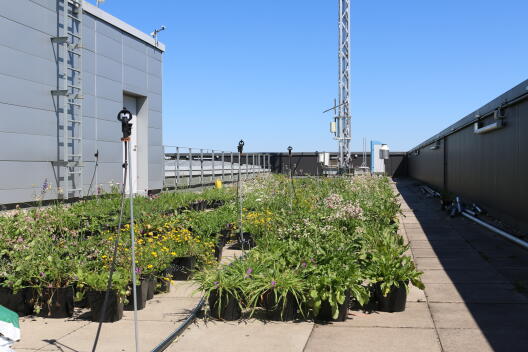
Wild plants can change when propagated agriculturally:
A new study examines the rapid domestication of wild plants that are agriculturally propagated for restoration purposes.
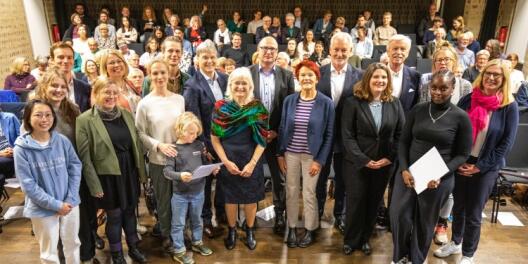
Urban gardening in the village and health promotion in the city district - these are the winning projects of the WWU Foundation's Citizen Science Competition 2022. They were now presented at the event "Mitdenken - Mitmachen - Mitforschen. An evening for civic engagement in science and research". The winners can look forward to a grant of 7,500 euros each.
After the successful student project "Monitoring of modern agroforestry ecosystems" in 2020, the CS Prize once again goes to researchers from the Institute of Landscape Ecology.
The artists' village Schöppingen is the focus of the winning project "Transformations in Münsterland". The community garden, kitchen, workshop, library, gallery and exhibition hall are understood as places of learning and knowledge for the citizens. What contribution can the village make as a socio-ecologically oriented actor for sustainable regional development? To this end, artists exchange ideas with students of landscape ecology and sociology on the significance of urban gardens for community building. Prof. Dr. Matthias Grundmann from the Institute of Sociology, Dr. Cornelia Steinhäuser from the Institute of Landscape Ecology and Julia Haarmann from the Foundation Künstlerdorf Schöppingen are leading the project.